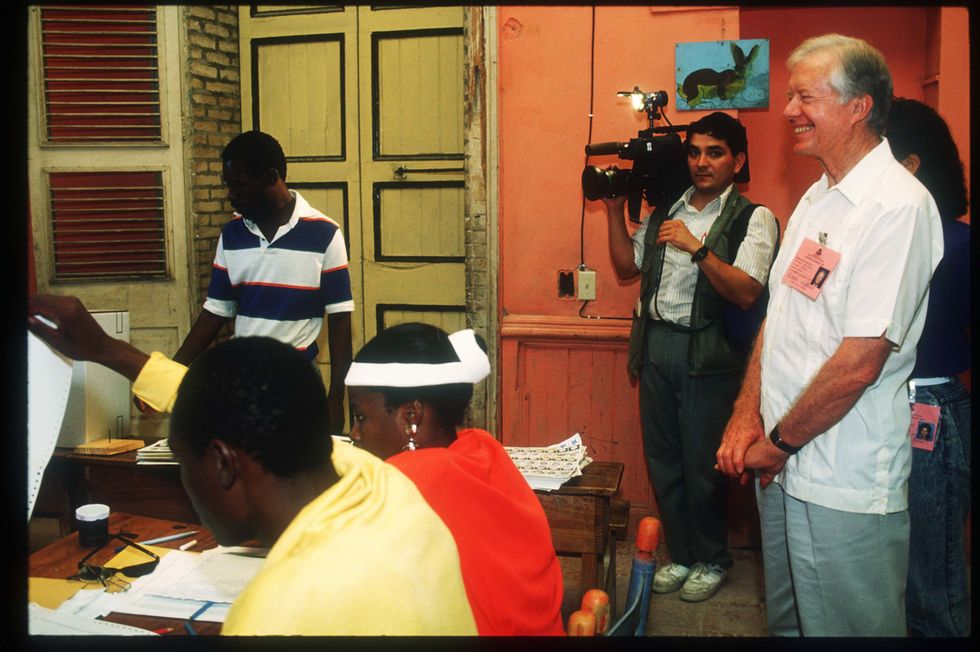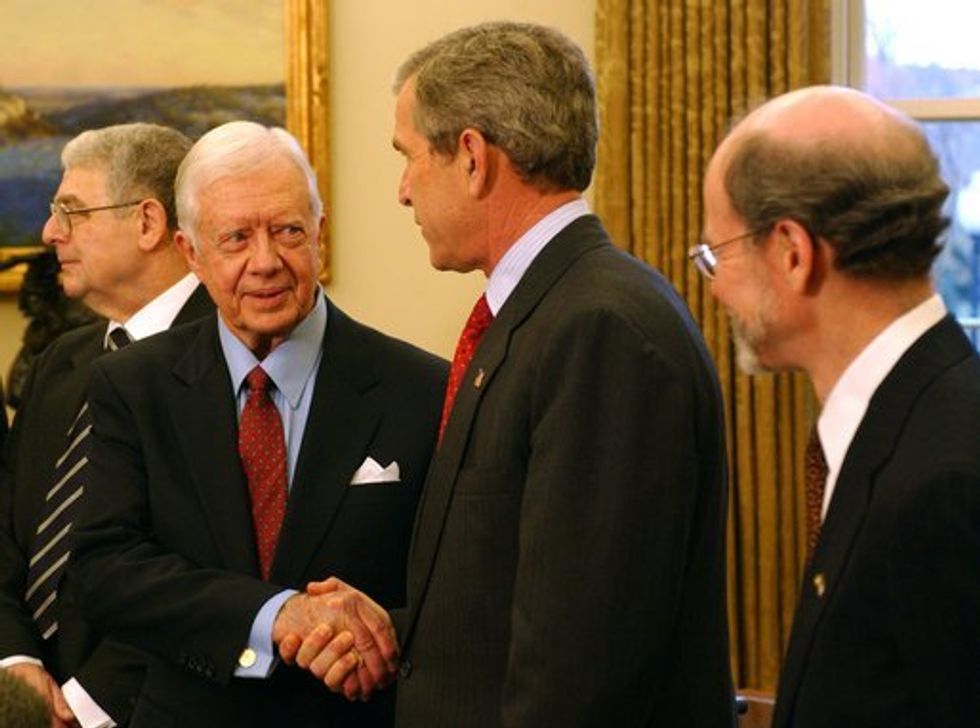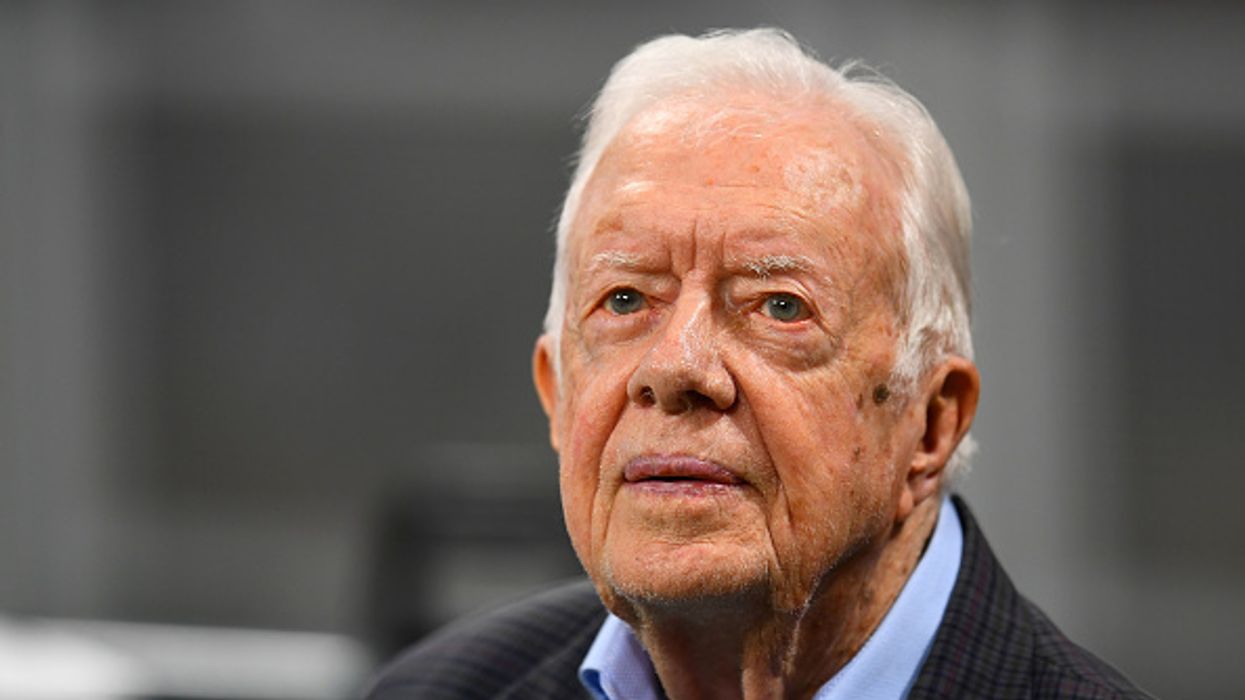Jimmy Carter, the 39th President of the United States, is being recognized for his steadfast commitment to the principles of democracy throughout his political career and beyond. Carter, the only Georgian ever elected to the White House, died on Sunday. He was 100 years old.
Carter is often celebrated for his steadfast commitment to the principles of democracy throughout his political career and beyond. From January 20, 1977, to January 20, 1981, his presidency was marked by a focus on human rights and democratic governance, both domestically and internationally.
Human Rights and Foreign Policy
 US President Jimmy Carter delivering his inaugural address at the US Capitol in Washington, January 20th 1977. Vice President Walter Mondale (1928 - 2021) is seated at right, former President Gerald Ford (1913 - 2006) at left. (Photo by UPI/Bettmann Archive/Getty Images)
US President Jimmy Carter delivering his inaugural address at the US Capitol in Washington, January 20th 1977. Vice President Walter Mondale (1928 - 2021) is seated at right, former President Gerald Ford (1913 - 2006) at left. (Photo by UPI/Bettmann Archive/Getty Images)
Carter's approach to foreign policy was notably different from that of many of his predecessors. He believed that the United States should not only promote its interests abroad but also uphold and advocate for human rights. This perspective was rooted in his personal convictions and guided his administration's dealings with various nations.
Carter articulated this vision in his inaugural address on January 20, 1977: "Because we are free, we can never be indifferent to the fate of freedom elsewhere. Our moral sense dictates a clear-cut preference for those societies which share with us an abiding respect for individual human rights.”
One of the significant aspects of Carter's foreign policy was his commitment to supporting democratically elected governments and advocating for political freedom. He was vocal in his opposition to authoritarian regimes, even those that were strategic allies of the U.S. at the time. This included a critical stance against the military dictatorships in Latin America and the apartheid regime in South Africa.
Carter withdrew U.S. support for the Somoza regime in Nicaragua. He reduced military aid to Augusto Pinochet in Chile, Ernesto Geisel in Brazil, and Jorge Rafael Videla in Argentina, citing concerns over human rights violations. He also negotiated the Torrijos–Carter Treaties, which established a timeline for the return of the Panama Canal to Panama in 1999.
By prioritizing human rights, Carter sought to reshape America's global image and encourage a more ethical foreign policy.
Promoting Democracy
One of Carter's most notable achievements in promoting democracy was the Camp David Accords in 1978. This landmark agreement between Egypt and Israel established a framework for peace in the Middle East and highlighted the importance of negotiation and dialogue in resolving conflicts. Carter's role as a mediator demonstrated his belief in the power of diplomacy and the necessity of democratic principles in achieving lasting peace.
“No region in the world has greater natural and human resources than this one, and nowhere have they been more heavily weighed down by intense hatred and frequent war,” he said as part of the address before a joint session of Congress on the Camp David meeting.
After leaving office, Carter continued to advocate for democracy and human rights around the globe. He founded the Carter Center in 1982, focusing on various initiatives, including promoting free and fair elections, improving global health, and resolving conflicts. The center has been involved in numerous election monitoring missions, helping to ensure that democratic processes are upheld in various countries.
 Former President Jimmy Carter observes voting procedures in Port-au-Prince, Haiti, in 1990.
Cynthia Johnson/Liaison
Former President Jimmy Carter observes voting procedures in Port-au-Prince, Haiti, in 1990.
Cynthia Johnson/Liaison
In Celebrate Jimmy Carter’s 100th birthday and his work on elections, Patrick Merloe, senior associate and director of electoral programs at the National Democratic Institute (NDI), wrote: He (Carter) first observed a foreign election in 1989 as co-leader, with former President Gerald Ford, of the joint international election observation mission to Panama organized by the nonpartisan National Democratic Institute and what is now the International Republican Institute. His role in helping to expose Manuel Noriega’s attempted fraud in that election had profound effects in Panama and inspired Carter to do more.
“In my role of almost three decades leading NDI’s international election programs, I had the honor of working closely with Carter in numerous elections,” Merloe said. “I witnessed him bring together for the first time in years the two antagonistic leaders of Bangladesh and negotiate their renouncing violence in an upcoming election. I saw him help Liberia’s contentious presidential candidates accept electoral results. He brought international attention to the credibility of Palestinian elections and promoted confidence in Peru’s post-Fujimori elections when public trust was fragile. Carter's commitment to democracy has also been evident in his writings and public speeches. He has consistently emphasized the importance of civic engagement, the rule of law, and the protection of individual rights as foundational elements of a healthy democracy."
While Carter's dedication to democracy and human rights has earned him respect, his presidency faced significant challenges, including economic issues and the Iran Hostage Crisis. Critics argue that his emphasis on human rights sometimes complicated U.S. relations with countries strategically important to American interests. Nonetheless, Carter's vision of democracy as a universal value remains a significant aspect of his legacy.
 President Bush Meets with Nobel Laureates, including fomer president, Jimmy Cartergeorgewbush-whitehouse.archives.gov
President Bush Meets with Nobel Laureates, including fomer president, Jimmy Cartergeorgewbush-whitehouse.archives.gov
Carter won the Nobel Peace Prize in 2002 “for his decades of untiring effort to find peaceful solutions to international conflicts, to advance democracy and human rights, and to promote economic and social development.”
“War may sometimes be a necessary evil. But no matter how necessary, it is always an evil, never a good. We will not learn to live together in peace by killing each other’s children,” Carter said in his Nobel acceptance speech.




















Trump & Hegseth gave Mark Kelly a huge 2028 gift